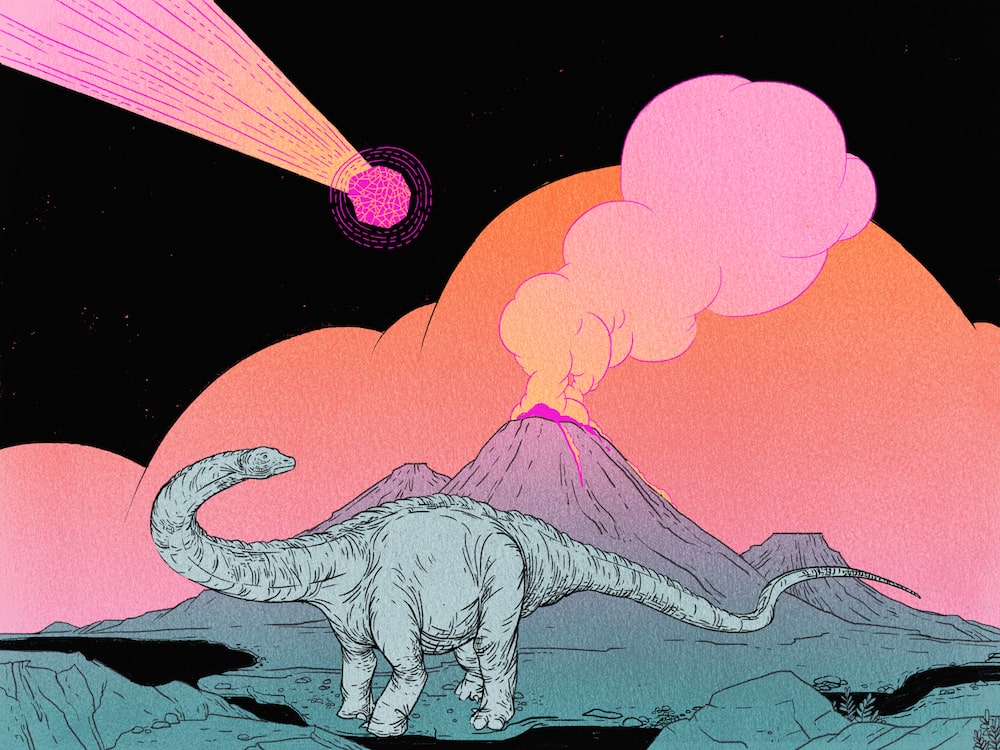What Really Killed The Dinosaurs?
6:02 minutes

 Undiscovered is a podcast from Science Friday and WNYC Studios about the left turns, missteps, and lucky breaks that make science happen. We tell the stories of the people behind the science, and the people affected by it. Listen to more episodes here.
Undiscovered is a podcast from Science Friday and WNYC Studios about the left turns, missteps, and lucky breaks that make science happen. We tell the stories of the people behind the science, and the people affected by it. Listen to more episodes here.
The prevailing theory says a meteorite led to the demise of the dinos. But Gerta Keller, a longtime geologist and paleontologist, isn’t buying it, and says volcanoes were the real culprit. The latest episode of Undiscovered tells her story, and asks whether conflict among scientists really makes science stronger. Co-hosts Elah Feder and Annie Minoff join Ira for a preview. Subscribe to Undiscovered wherever you get your podcasts.
Elah Feder is the former senior producer for podcasts at Science Friday. She produced the Science Diction podcast, and co-hosted and produced the Undiscovered podcast.
Annie Minoff is a producer for The Journal from Gimlet Media and the Wall Street Journal, and a former co-host and producer of Undiscovered. She also plays the banjo.
IRA FLATOW: Next up, our science documentary podcast “Undiscovered” is back with its second season. Boy, we’re glad it is. And in our next episode, it covers one of my favorite topics, the mystery of what killed the dinosaurs. Well, it used to be a mystery. But 40 years ago some scientists came up with an answer, which became the one theory to rule them all, as you can hear in this survey of people outside the American Natural History Museum in New York.
SPEAKER 1: Meteorite.
SPEAKER 2: Meteorite.
SPEAKER 3: An asteroid?
SPEAKER 4: Meteorites.
[NON-ENGLISH SPEECH]
SPEAKER 5: A rock, a big rock.
SPEAKER 6: From the sky.
IRA FLATOW: A lot of people think this is the case closed, right? The meteorite, an asteroid from the sky killed the dinosaurs, except one scientist who isn’t buying it. The new episode of “Undiscovered” tells her story and our co-hosts, Elah Feder and Annie Minoff are here to talk about it. Welcome back.
ANNIE MINOFF: Thanks for having us.
ELAH FEDER: Thank you.
IRA FLATOW: So meteorite theory, I thought that was pretty settled.
ELAH FEDER: Yeah. A lot of people did. Oh, this is Elah, by the way. A lot of people have treated this as scientific gospel since the ’80s. And just to spell out what we’re talking about, it’s the idea that 66 million years ago, big rock from space slams into the Earth, kicks up a lot of dust which blocks out the light, causes all kinds of environmental changes, and then very suddenly, a lot of species die out, including the dinosaurs. So that is the concept.
IRA FLATOW: But your episode is by the scientist who says that idea is dead wrong.
ANNIE MINOFF: Correct. And we’re talking about Gerta Keller. She’s a geologist and paleontologist at Princeton University. And she, for the last 30 years, has been an extremely loud holdout on the so-called Impact Hypothesis. Like as long as this theory has been around, almost, she’s been opposing it.
She says, she’s been ostracized by her colleagues, shouted down at conferences. And just speaking for myself, I don’t know how long I could keep up my opposition under that kind of peer pressure.
ELAH FEDER: So Gerta is not like most people. She is very tough. Actually, when I spoke to her, she would often refer to people just casually as her enemies. And so–
ANNIE MINOFF: That’s pretty hardcore.
ELAH FEDER: She’s a particular kind of person. And just to give you a sense of what she’s like, we want to play you an excerpt from the episode, where Greta describes a brush with death that she had at 22. So this happens. She’s at the hospital. And she has a wound that everyone thinks is probably fatal. And there’s a priest there trying to read her her last rites.
ANNIE MINOFF: Here’s what happened.
GERTA KELLER: I got the last rites. And the priest told me I had to confess. And all I could tell him, no.
ANNIE MINOFF: You told him no?
GERTA KELLER: This was funny.
ELAH FEDER: After this, Gerta passes out. She comes to and there is that priest again. Last chance, you’re gonna die, time to confess.
GERTA KELLER: And I say, no. And I pass out again. Then, evidently, they removed him after that.
IRA FLATOW: I’m Ira Flatow. This is Science Friday from WNYC Studios.
ANNIE MINOFF: So that’s pretty much classic Gerta right there.
IRA FLATOW: So if she doesn’t believe the dinosaurs were killed by a meteorite, what does she believe then?
ELAH FEDER: Well, so Gerta, first of all, I think more than anything, she’s in the never meteorite camp.
ANNIE MINOFF: More than espousing a theory, it’s an anti-theory.
ELAH FEDER: Her position is opposition. And the reason she thinks that the Impact Hypothesis is wrong is because, according to this hypothesis, this rock from space hits the Earth, wipes out a ton of species. Geologically speaking, this happens very suddenly, kind of all at once and it’s not just dinosaurs. It’s plants. It’s other animals, microscopic things. And so if you look across the fossil record, you should see a very abrupt mass extinction.
But Gerta, when she looks at the fossil record, she doesn’t see a sudden mass extinction. She sees the species dying out gradually. And she says that they start dying well before the point where this meteorite is supposed to hit. So her conclusion is that, obviously, there was something killing a lot of species at the end of the Cretaceous. That’s not in dispute. But she says it couldn’t have been the meteorite, because it came on the scene too late.
ANNIE MINOFF: It’s like saying someone got shot before the gun went off, kind of.
ELAH FEDER: Yeah. So one of the interesting things about working on this episode, and really frustrating things, is that paleontology, I mean, there’s a lot of room for interpretation, not as much room as maybe– well, some people tell, you within reason.
And the reason for that is that paleontologists are dealing with very imperfect fossil records from long ago. And if something is missing in that fossil record, if a species isn’t there, it doesn’t necessarily mean it’s extinct. It could mean that it’s just not preserved.
IRA FLATOW: Well, if you want to hear what really happened and what Gerta really thinks, you have to tune into our podcast. That’s Elah Feder and Annie Minoff, co-host and producer our science documentary podcast, “Undiscovered.” You can check out that episode next Tuesday and more stories from “Undiscovered” season two. Here’s the address undiscoveredpodcast.org, or wherever you get your podcasts. Thanks, guys.
ANNIE MINOFF: Hey. Thanks for having us.
IRA FLATOW: One last thing before we go. I got a pop quiz for all our west coast listeners. What has science, beer, and yours truly making bad science puns all night? Well, it’s the Science Friday Trivia. Yeah. We’re bringing the party to Portland on October 9th at the Oregon Museum of Science and Industry.
That’s Portland, October 9th. And you can join me for a laugh-filled night of geeky science trivia as you compete for the title of Geekery Grand Master Champion. How would you like that title? More info at sciencefriday.com/portland. That’s sciencefriday.com/portland.
We had technical engineering help from Rich Kim and Sarah Fishman and here at KUER, from Michael Havey, Lewis Downey, and Tim Slover. I’m Ira Flatow in Salt Lake City.
Copyright © 2018 Science Friday Initiative. All rights reserved. Science Friday transcripts are produced on a tight deadline by 3Play Media. Fidelity to the original aired/published audio or video file might vary, and text might be updated or amended in the future. For the authoritative record of Science Friday’s programming, please visit the original aired/published recording. For terms of use and more information, visit our policies pages at http://www.sciencefriday.com/about/policies/
Christopher Intagliata was Science Friday’s senior producer. He once served as a prop in an optical illusion and speaks passable Ira Flatowese.